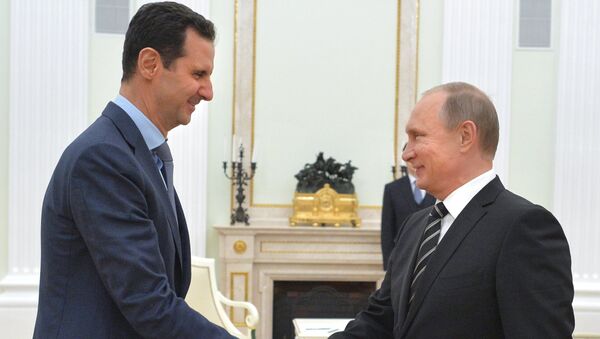"Assad will continue to be a key player in Syria," Schirach said on Monday. "This is a significant political victory for [Russian] President Vladimir Putin."
Although the ceasefire was the result of an agreement between the United States and Russia, the real reason for it was the success of Russian air support in stopping Daesh advances and transforming the dynamic of the war, Schirach maintained.
"The Syria ceasefire initiative has been made possible by Russia's influence in the country. Moscow has given the Assad government tangible military support via the air campaign against its enemies. This has shifted the balance of forces on the ground," he explained.
Assad had become more flexible and more open to compromise because of the recent Russian successes, Schirach pointed out.
"Before the Russians came to his rescue, Assad was in serious danger. But now he should be reasonably reassured that Moscow will continue to protect him. He will not become a casualty of any future peace negotiation: Hence his agreement to a cease fire," he said.
The suffering in Syria still had to be addressed, but the ceasefire at last offered a realistic path to peace, Schirach predicted.
"While Syria remains a horrible quagmire with untold suffering for millions of displaced civilians, Russia has firmly established itself as a legitimate player in the country, and as a key broker in any deal that may lead to the end of the conflict," he stated.
"While nobody says so explicitly, while technically co-chair of this peace initiative, Washington is in fact the junior partner. And this is because the US has almost no leverage on the ground in Syria," he insisted.
The rebel forces that the Obama administration had promoted now had no hope of ever taking power, Schirach argued.
"Thanks to the Russian bombing campaign, the US-supported rebels have been losing ground… Washington is in no position to bargain on behalf of the rebels. It is now a foregone conclusion that Obama's old plan to have Assad removed from power is off the table," he said.
US President Barack Obama had no intention of increasing Washington's involvement in the Syrian conflict, Schirach said.
"He [Obama] is in the final year of his presidency. There is no political support in America for getting involved more deeply in another Middle Eastern conflict," he concluded.
Paolo von Schirach is a Professor of International Relations at BAU International University in Washington, DC, and publisher and editor of the Schirach Report.



